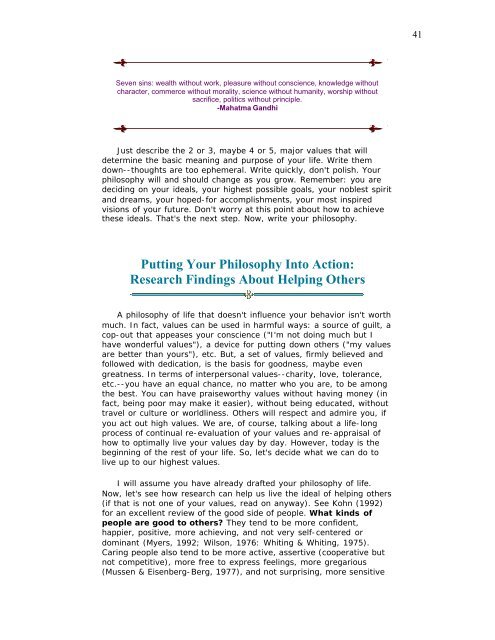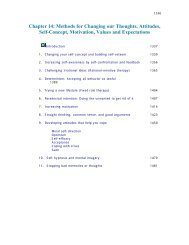Chapter 3: Values and Morals:Guidelines for living - Psychological ...
Chapter 3: Values and Morals:Guidelines for living - Psychological ...
Chapter 3: Values and Morals:Guidelines for living - Psychological ...
You also want an ePaper? Increase the reach of your titles
YUMPU automatically turns print PDFs into web optimized ePapers that Google loves.
Seven sins: wealth without work, pleasure without conscience, knowledge without<br />
character, commerce without morality, science without humanity, worship without<br />
sacrifice, politics without principle.<br />
-Mahatma G<strong>and</strong>hi<br />
Just describe the 2 or 3, maybe 4 or 5, major values that will<br />
determine the basic meaning <strong>and</strong> purpose of your life. Write them<br />
down--thoughts are too ephemeral. Write quickly, don't polish. Your<br />
philosophy will <strong>and</strong> should change as you grow. Remember: you are<br />
deciding on your ideals, your highest possible goals, your noblest spirit<br />
<strong>and</strong> dreams, your hoped-<strong>for</strong> accomplishments, your most inspired<br />
visions of your future. Don't worry at this point about how to achieve<br />
these ideals. That's the next step. Now, write your philosophy.<br />
Putting Your Philosophy Into Action:<br />
Research Findings About Helping Others<br />
A philosophy of life that doesn't influence your behavior isn't worth<br />
much. In fact, values can be used in harmful ways: a source of guilt, a<br />
cop-out that appeases your conscience ("I'm not doing much but I<br />
have wonderful values"), a device <strong>for</strong> putting down others ("my values<br />
are better than yours"), etc. But, a set of values, firmly believed <strong>and</strong><br />
followed with dedication, is the basis <strong>for</strong> goodness, maybe even<br />
greatness. In terms of interpersonal values--charity, love, tolerance,<br />
etc.--you have an equal chance, no matter who you are, to be among<br />
the best. You can have praiseworthy values without having money (in<br />
fact, being poor may make it easier), without being educated, without<br />
travel or culture or worldliness. Others will respect <strong>and</strong> admire you, if<br />
you act out high values. We are, of course, talking about a life-long<br />
process of continual re-evaluation of your values <strong>and</strong> re-appraisal of<br />
how to optimally live your values day by day. However, today is the<br />
beginning of the rest of your life. So, let's decide what we can do to<br />
live up to our highest values.<br />
I will assume you have already drafted your philosophy of life.<br />
Now, let's see how research can help us live the ideal of helping others<br />
(if that is not one of your values, read on anyway). See Kohn (1992)<br />
<strong>for</strong> an excellent review of the good side of people. What kinds of<br />
people are good to others? They tend to be more confident,<br />
happier, positive, more achieving, <strong>and</strong> not very self-centered or<br />
dominant (Myers, 1992; Wilson, 1976: Whiting & Whiting, 1975).<br />
Caring people also tend to be more active, assertive (cooperative but<br />
not competitive), more free to express feelings, more gregarious<br />
(Mussen & Eisenberg-Berg, 1977), <strong>and</strong> not surprising, more sensitive<br />
41












